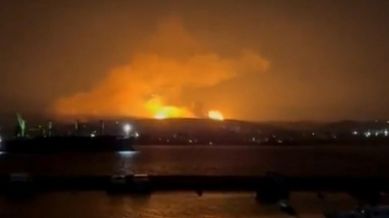Stay updated with the latest - Click here to follow us on Instagram
WATCH: Israel’s heaviest bomb strikes in Syria felt on Richter scale
The massive explosion and subsequent secondary blasts suggested a large cache of stored armaments in the area.

Israeli strikes on Syrian military sites on Sunday caused massive explosions, filling the skies over the coastal Tartus region, with reports stating the blasts were even detected by earthquake sensors.
The Syrian Observatory for Human Rights (SOHR) described the attacks as “one of the heaviest strikes” in the area in over a decade. “Israeli warplanes carried out strikes targeting multiple sites, including air defence units and surface-to-surface missile depots,” the group stated, calling it “the heaviest bombardment in Syria’s coastal region since the strikes began in 2012”.
The explosion was so massive that it registered as a 3.1 magnitude earthquake on seismic sensors, according reports by various media outlets.
The Times of Israel reported that several Hebrew media channels attributed the strikes to Tel Aviv. “A 3.1 magnitude temblor was recorded by the Geographic Survey of Israel’s seismology department at 11:49 p.m. last night, with its epicentre located approximately 28 kilometres (17 miles) off the coast of the city of Banias,” the report stated.
The massive explosion and subsequent secondary blasts suggested a large cache of stored armaments in the area.
Dramatic videos of the blast circulate on social media
Videos shared widely on social media showed a bright flash of light followed by a series of explosions, resulting in an enormous cloud of smoke billowing into the sky.
The report by SOHR stated, “Israeli fighter jets struck missile launchers in the 107th Barracks in the Hama area and weapon depots in the Tartus countryside. However, no casualties were reported.”
Last week, Russia’s foreign ministry announced it had evacuated some of its diplomatic staff from Syria, following reports that President Bashar al-Assad had fled the country.
Tartus has historical significance as the site of a naval facility established by the Soviet Union in 1971. Until 2017, it was classified as a “Material-Technical Support Point” rather than a full naval base. It remains Russia’s only access point to the Mediterranean.
The facility played a key role in supplying armaments after Russia became involved in the Syrian civil war in 2015.
On Wednesday, a Kremlin spokesperson confirmed that Moscow was in communication with Syria’s new leadership to discuss the future of Russian military bases in the country.